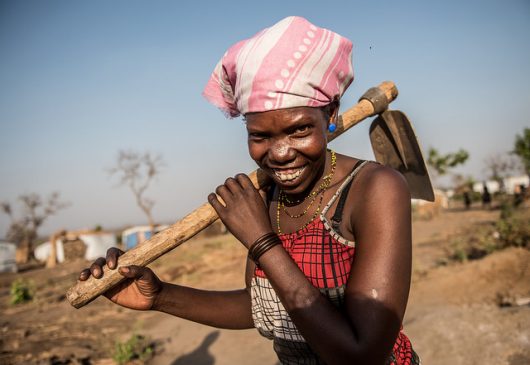Two Current Programs for Sustainable Agriculture in Nigeria

Nigeria is the most populous country in Africa, the seventh largest in the world, and is growing faster than any other nation in the top fifteen of that list. When policy makers address the issue of a growing world and necessary advances in food technology, Nigeria must be a key part of that solution. Below are snapshots of two current programs working to improve sustainable agriculture in Nigeria.
A New Variety of Cassava
Catholic Relief Services (CRS) is working with farmers in Nigeria to improve sustainable production of cassava. Cassava is a staple crop in tropical countries worldwide and has a number of advantages that make it a reliable crop in food-stressed areas. The plant is drought-resistant, can grow in marginal soils and has year-round availability.
CRS recently began a four-year project in Nigeria called Sustainable Cassava Seed Systems. The project delivers improved strains of cassava to the participants, along with education on maintaining and marketing the improved crops. According to one local farmer, the variety delivered by the CRS program produces more than three times the harvest compared to local varieties of cassava. This result is turning subsistence farmers in Nigeria into agricultural entrepreneurs, and ones who can return investments to their communities.
Nigeria is the world’s largest producer of cassava, and the crop provides more calories per acre than any other tropical staple. As a key item in feeding a growing world population, increasing the sustainability and efficiency of growing cassava can have an inordinate impact in the elimination of global poverty.
Youth Initiative for Sustainable Agriculture
Besides being one of the largest and fastest growing countries in the world, Nigeria is also one of the youngest. Having such a large proportion of youth in a country can severely impact tax education and other infrastructure, but youth is not always a burden — in Nigeria, the youth are a formidable political presence, and youth organizations often play a major part in other social realms as well.
YISA, the Youth Initiative for Sustainable Agriculture, was founded in 2012 in Abjua and has a cooperative group of young people from 15-40 years old that run several programs to support and encourage sustainable agriculture in Nigeria.
Among YISA’s current programs are the Environmental Sustainability Project, the Youth Agricultural Reorientation Program and the Market Linkage Program. These programs promote education in the realm of environmentally responsible agriculture, introduce urban and unemployed youth to farming skills and productive agricultural pursuits and develop commercial outlets for sustainable agricultural products in Nigerian Markets.
While sustainable agriculture in Nigeria stagnated somewhat in the late twentieth century (in large part because of the nation’s enthusiasm for oil revenues), the Nigerian government and international organizations have returned to focus on Nigeria’s impressive agricultural potential. In a nation of over 180 million people, it comes as no surprise that the programs highlighted here merely scratch the surface of current activity. As these and other projects mature and develop, Nigeria will become an ever-larger presence in sustainable food production in the 21st century.
– Paul Robertson
Photo: Flickr
